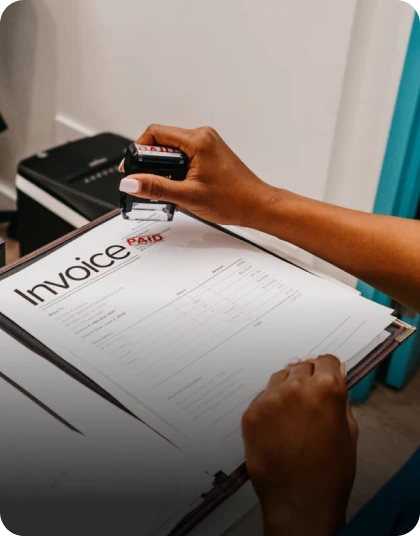Revenue-Based Financing to Cover Business Growth & Expenses
Flexible financing as much as $2M+ to cover daily operational needs.
By accessing or applying for Business Finance Services from Biz2Credit relating to your potential business funding or other business financing products, you agree to our Terms of Service, Business Financing Terms and Conditions, and Privacy Policy.
Revenue-Based Financing Made Simple ⓘ
$25K–$2M+
Financing Amounts Range
$110,000*
Average Financing Amount
60 Seconds**
Prequalify In
Tailored Support
Dedicated Funding Specialists
*Estimates based on all revenue-based financing transactions January 2024 – December 2024.
**Create your Biz2Credit account to get an initial estimate of how much your business could receive ⓘ .

Understanding Revenue-Based Financing
Revenue-based financing (RBF) is a funding solution where businesses receive capital in exchange for a percentage of their estimated future receivables. It’s not a traditional loan, which means there’s no fixed repayment amount or schedule. Instead, repayments depend on your future sales.
If your revenue dips one month or rises the next, your repayment will adjust accordingly. That’s what makes revenue-based financing appealing to growing companies with fluctuating income. Unlike equity financing, you don’t give up ownership or any part of your company. And unlike rigid loans, there’s no pressure to meet high monthly obligations.
This makes revenue-based funding ideal for businesses that want flexibility without sacrificing control.
Why Choose Revenue-Based Financing
Revenue-based financing offers business owners the flexibility they need without the burden of fixed repayments or equity loss. If your company is experiencing growth or fluctuating sales cycles, this option can provide the right balance of support and control.
Here's why more businesses are turning to revenue-based financing as their go-to solution:
Growth-Friendly Terms
Whether you're hiring staff, buying inventory, or expanding locations, the structure of revenue-based funding gives you room to grow. Since repayments match your revenue flow, you’re not overextended during leaner months. This makes it one of the best revenue-based financing options for fast-growing or fast-changing businesses.
Flexible Repayments
One of the biggest advantages of revenue-based financing is that payments automatically adjust based on your monthly revenue. This keeps cash flow predictable and frees you from the stress of missing fixed loan instalments. It's especially helpful for businesses with variable monthly sales. Unlike traditional debt, this funding structure adjusts with your business cycle.
No Equity Dilution
With revenue-based business funding, you don’t trade ownership for capital. Unlike venture funding, you retain full control over your business decisions. This makes it an attractive option for entrepreneurs who want growth capital without giving up a stake in their company. Maintaining 100% ownership means you stay in the driver’s seat while still gaining access to critical business funds.
Faster Access to Funds
Traditional loans often involve weeks of waiting and back-and-forth. With revenue-based financing, the process moves quickly, sometimes within a few days. By analyzing your real-time revenue data or sales reports, platforms can assess your eligibility and move fast. This speed is critical for businesses facing sudden opportunities or urgent needs.
Minimal Collateral
Many revenue-based financing companies don’t require hard collateral like property or inventory. That’s a game-changer for businesses that don’t have physical assets to pledge. Your future income stream becomes the basis for trust.
Simple Qualification
If you've been denied traditional financing due to credit history, revenue-based financing can still be within reach. The structure focuses more on actual performance (your current and projected revenue) than on your FICO score. This is not to say FICO score doesn’t play a role but it is a combination of both the aspects that determine whether you can secure the financing or not. It’s a more inclusive way to fund businesses with real potential.
How to Apply for Revenue-Based Financing
Create Your Biz2Credit Account
Sign up and provide a few key business details.
Get
Pre-Qualified
See your pre-qualified offers tailored for your business.
Submit Your Application
Complete a short form about your funding needs.
Receive Funding Decision
Once reviewed, we'll let you know your application status.
Is Revenue-Based Financing Right for Your Business?
Simple requirements to unlock revenue-based financing
-
$250,000 or more
Steady Annual Revenue
-
575+
Credit Score
-
At least 12 months
Time in Business Operations
What You Need to Apply for a
Revenue-Based Financing
Qualifying for a business revenue loan is generally simpler than for traditional loans, but certain criteria still matter. If
you're earning consistent revenue and can show clear sales performance, you’re already halfway there.
Here’s what most platforms look for:
Consistent Monthly Revenue
Stability is key. Most providers of revenue-based financing want to see steady sales coming in month after month. A predictable revenue stream, especially if it’s recurring or subscription-based, signals that your business can handle gradual repayments. It’s not about how much you make, but how regularly you earn. At Biz2Credit, we look for at least $250,000 and more in annual revenue.
A Minimum of 575+ Credit Score
Biz2Credit accepts a minimum credit score of 575. This is very important as any application with a score below this one will not get accepted.
At Least 12 Months in Operation
Your business should have some operational history. Biz2Credit accepts applicants with at least 12 months or more in operation. This track record proves your staying power and gives confidence that your revenue pattern is reliable. Longer tenure may improve odds of positive funding decision.
Smarter Ways to Use Revenue-Based Financing
Revenue-based financing is more than just a funding method. It’s a tool that helps fuel targeted growth. With flexible repayments, you can invest where it matters most without stressing about fixed instalments.
Here’s how to put your funds to work:
How to Strengthen Your
Revenue-Based Financing Application
Getting approved for revenue-based financing is simpler than traditional loans but a few smart moves can boost your odds. Here’s how you can position your business:
- Show Consistent, Reliable Revenue
- Use Digital Payment and Accounting Tools
- Separate Business and Personal Accounts
- Highlight Growth Opportunities
- Be Transparent and Ready
Most revenue-based financing companies want to see stable income trends. If you’re seeing dips, take steps to even out your cash flow before applying. Recurring payments or repeat customer sales go a long way in building confidence.

Clean data is critical. Sync your POS system, ecommerce platform, or accounting software to demonstrate transparency. These systems offer easy-to-verify sales records that support your eligibility for revenue-based loans.

Keep business transactions separate. A well-managed, active business account makes your numbers easier to track and helps with faster decisions. It also proves that your revenue streams are legit and tied to real operations.

If your revenue is trending up, make that clear in your application. Platforms offering revenue-based business financing want to see that your sales are not only steady but improving. Momentum may increase approval chances.

Have your bank statements, merchant processor data, and other documentation ready to go. The easier you make it to review your business, the faster your revenue-based financing decision will be.

Trusted by Thousands of Small Business Owners in America.**
Simply because we get what you go through to build a business you believe in.
**Disclaimer: All stories are real, as told by real business owners. Customers do not receive monetary compensation for telling their stories.
Revenue-Based Financing Articles
FROM THE KNOWLEDGE CENTER*
*This information is provided for general information only ⓘ, does not constitute financial advice, and does not necessarily describe Biz2Credit commercial financing products.
Revenue-Based Financing: A Flexible Way to Raise Funds Without Giving Up Equity
Small business owners may face a lot of challenges in finding the right ways to raise funds, especially if they’re not ready to give up ownership.
Cash Flow Management vs. Profitability What Matters More
Running a small business is not an easy job. It requires small business owners to juggle at every step and make tough choices.
Capital Funding Strategies - Grow Your Business Without Giving Up Equity
When you decide to start a business, you think of many scenarios that can come up between this dream of yours. It is not just starting a business
Which Type of Funding is Better for Your Business: Business Capital Loan or Revenue-Based Financing?
Being an entrepreneur is not an easy task. Most of the time, it might feel as if you are just putting out one fire after another.
Cross-Collateralization in Lending: A Powerful Tool or a Dangerous Trap?
In business lending, collateral plays a big role in securing funds. One strategy that’s gaining attention is cross-collateralization.
Funding the Future: Navigating Emerging Trends in Small Business Financing
The landscape of business financing continues to evolve as interest rates, regulations, and other policies impact lenders.
Seven Steps for Business Acquisition Loan Success
When you decide to acquire a business, you want to be in the best shape you can to make the offer to win the deal and have the best financing option.
What to Do If You Don’t Qualify for Business Lending: 5 Steps
Whether it’s due to limited credit history, inconsistent cash flow, or simply a tough economic climate, hearing “no” from a business lending
Where to Find Loans for Liquor Stores When Cash Flow Dries Up
Every small business faces challenges from time to time. In the retail business, you have a few unique opportunities to find financing
Frequently Asked Questions
Why choose revenue-based financing over traditional loans?
How does revenue-based financing impact my credit?
What happens if my sales drop and I can't make a payment?
What types of businesses benefit most from revenue-based financing?
What happens if my revenue fluctuates?














